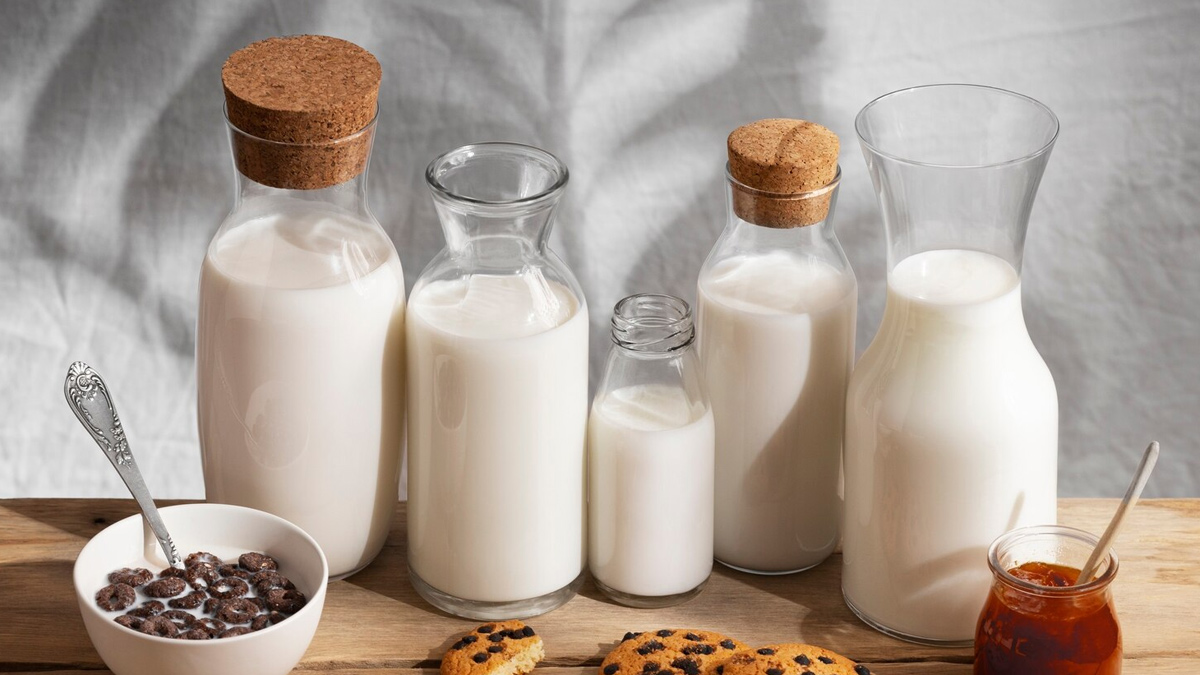
Do you always feel bloated after drinking milk? If yes, then you are not alone. This is a very common issue. Many people complain of feeling bloated, right after they consume milk. To avoid this, you must know your gut well. This is because which milk is suitable for whom, this entirely depends on our gut health. Sounds complicated? Don’t worry, we are here to help you. Today, we will tell you all about milk-induced bloating, how to beat it and choosing the right milk for your gut.
Table of Content:-
The editorial team of OnlyMyHealth reached out to Dr Geetika Chopra, Celebrity Holistic Nutritionist to get a better understanding of this. Read ahead.
Why Does Milk Cause Bloating?
Milk is one of the most commonly consumed drinks worldwide, yet many people experience discomfort, heaviness, or bloating after drinking it. “Whether it’s dairy milk, lactose-free milk, or plant-based options — your gut’s response depends on digestion, enzymes, and sensitivity levels. Milk can cause bloating for several reasons, the most common being lactose intolerance,” shares Dr Chopra. Our expert lists down the probable reasons why milk can cause bloating:
- Lactose is the natural sugar in milk, and some people lack enough lactase enzyme to break it down. When lactose remains undigested, it ferments in the gut, leading to gas production, bloating, and discomfort.
- Another reason is A1 casein, a type of protein found in regular cow’s milk that can irritate sensitive digestive systems, especially in people with inflammation or gut issues.
- Some individuals react to milk fat, which slows digestion and increases heaviness.
- Additionally, milk can trigger bloating if consumed in large quantities, taken cold, or paired incorrectly with certain foods.
- Gut Dysbiosis, Irritable Bowel Syndrome (IBS), or dairy allergies can also intensify symptoms.
“So, bloating isn’t always about lactose — it can be due to proteins, fat content, or overall gut health,” says Dr Chopra.
Also Read: Is Coconut Milk Bad For Cholesterol? Expert Sheds Light
Ranking The Worst To Best Milk For Your Gut
Dr Chopra ranks the different varieties of milk – from worst to best – depending on which are most likely to cause bloating. Take a look:
Worst (Most Likely to Cause Bloating) → Best (Least Likely)
1. Regular Cow’s Milk (A1 milk)
– High in lactose + A1 casein, double trigger for bloating.
2. Buffalo Milk
– Higher fat content, slower digestion, heavy on the gut.
3. Full-Fat Cow Milk
– Fat slows down digestion, increasing gas formation.
4. Toned/Double-Toned Milk
– Lower fat but still contains A1 casein; moderate bloating risk.
5. Goat Milk (A2 protein)
– Easier to digest, lower lactose than cow’s milk.
6. A2 Desi Cow Milk (Gir/Sahiwal)
– A2 casein is gentler on the gut.
7. Lactose-Free Cow Milk
– Best for lactose-intolerant individuals; zero lactose-related bloating.
8. Plant-Based Milks (Best tolerated)
– Options like almond, soy, oat, coconut, and cashew milk; no lactose, no casein.
(Note: Soy milk may cause gas in some individuals due to oligosaccharides).
How To Choose The Right Milk For Your Gut?
Now that we know why milk causes bloating, and which milk is likely to cause it – it’s time to guide you on choosing the right milk for your gut.
“The right milk depends on your body’s tolerance and digestion. If you often feel bloated after drinking milk, begin by assessing whether you may be lactose intolerant — switching to lactose-free milk or plant-based milk can provide immediate relief. If the issue is linked to milk proteins, opt for A2 milk (from desi cows or goats), which lacks the inflammatory A1 casein and is gentler on digestion,” explains Dr Chopra.

She adds, “People with IBS or acidity may prefer low-fat milk or plant-based alternatives like almond or coconut milk. Those with hormonal imbalance often find full-fat dairy hard to digest and may benefit from toned or plant-based options. Start with small servings, observe your body’s response, and continue with the milk that leaves you feeling light, energetic, and comfortable.”
Dr Chopra also shares a word of advice: “Get your food intolerance test done — because when it comes to milk bloating, guesswork can take months. You can either experiment with different types of milk while keeping a detailed food journal, or you can directly opt for a food intolerance test to understand exactly what your body reacts to. Many people are surprised to find that the issue isn’t always lactose; sometimes it’s casein, milk fat, A1 protein, or even a combination of foods they consume with milk. The results often shock people — but they finally give clarity, relief, and a personalised direction for choosing the right milk for their gut.”
How Long Does Milk Bloating Last?
Let us now try to understand the duration of milk-related bloating. Dr Chopra says, “Milk-induced bloating usually lasts 2 to 12 hours, depending on the severity of intolerance and the amount consumed. If the cause is lactose intolerance, symptoms may last longer due to ongoing fermentation.”
Speaking on how to get relief from bloating and discomfort caused by milk, she says, “To reduce discomfort, sip warm water or herbal teas like peppermint, ginger, or fennel to relieve gas. Avoid lying down immediately — take a short walk to activate digestion. Applying a warm compress on the stomach can also ease discomfort. If bloating happens frequently, it’s best to identify whether the issue is lactose, casein, fat content, or overall gut sensitivity. Persistent or severe symptoms warrant a medical evaluation.”
Also Read: Beat the Bloat: Simple Daily Habits That Reset and Strengthen Your Gut
Tips To Reduce Milk-related Bloating
On this note, the expert shares tips to reduce and deal with bloating after drinking milk:
- To reduce bloating, begin by consuming milk warm, not cold — warm milk is easier on digestion. Avoid pairing milk with heavy, spicy, or fermented foods.
- Always drink milk slowly rather than gulping it down.
- If you suspect lactose intolerance, try lactose-free dairy or use lactase enzyme drops before drinking milk.
- Adding a pinch of turmeric, ginger, cardamom, or cinnamon makes milk easier to digest.
- Space milk away from large meals by at least 1–2 hours to prevent fermentation and heaviness. Plant-based milks are a great alternative if dairy consistently causes problems.
- Maintaining a healthy gut — through probiotics, fibre, and adequate water intake — also reduces bloating significantly.
The Final Word
Milk can cause bloating due to different reasons, the most common being lactose intolerance. The right milk depends on your body’s tolerance and digestion. If you often feel bloated after drinking milk, begin by assessing whether you may be lactose intolerant or get a food intolerance test done.
Also watch this video
FAQ
Can drinking milk cause bloating?
Yes, milk can cause bloating in some people, primarily those with lactose intolerance.How long does milk bloating last?
Symptoms can last 24-72 hours, based on your tolerance level and how much lactose you consumed.How can I reduce bloating quickly?
To get fast relief from bloating, try light physical activity like a walk or gentle stretches, drinking warm water or herbal teas (ginger, peppermint), and using a heating pad on your abdomen.
How we keep this article up to date:
We work with experts and keep a close eye on the latest in health and wellness. Whenever there is a new research or helpful information, we update our articles with accurate and useful advice.
Current Version
Nov 20, 2025 13:52 IST
Modified By : Shruti DasNov 20, 2025 13:52 IST
Published By : Shruti Das